Identifying bivalve shellfish
Learn how to identify the main species of bivalve shellfish harvested in Canada.
On this page
Clams
Species of harvested clams include the following.

Arctic wedge clam (Mesodesma arctatum)
- Maximum length: 4 cm
- Colour: greyish-white
- Shape: wedge
- Location: Atlantic coast
- Habitat: continental shelf waters to depths of 90 m
- Note: this clam is unique because it doesn’t shrink once cooked
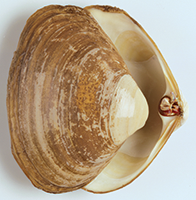
Atlantic surf clam (Spisula solidissima)
- Maximum length: 17.5 cm
- Colour: yellowish-white
- Shape: V-shaped
- Location: Atlantic coast
- Habitat: shallow holes in sand bars or ocean floor to water depth of 75 m
- Note: also known as a bar clam
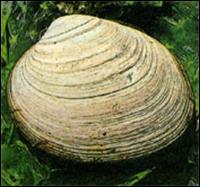
Butter clam (Saxidomus gigantea)
- Maximum length: 13 cm
- Colour: yellow or greyish-white
- Shape: square or oval
- Location: Pacific coast
- Habitat: holes under tidal beach or ocean floor to water depth of 15 m
- Note: stays on a single beach for life
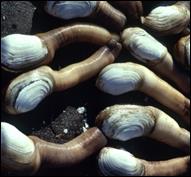
Geoduck clam (Panopea generosa)
- Maximum length: the shell is 20 cm
- Colour: the shell is white and the neck is reddish-brown
- Shape: the shell is rectangular
- Location: Pacific coast
- Habitat: holes under tidal beach or ocean floor to water depth of 100 m
- Note: long neck
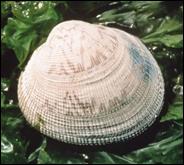
Littleneck clam (Protothaca stamineais)
- Maximum length: 7 cm
- Colour: white or grey with brown areas
- Shape: round
- Location: Pacific coast
- Habitat: holes under tidal beach or ocean floor to water depth of 12 m
- Note: rings on shell show the clam’s age
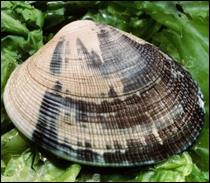
Manila clam (Venerupis philippinarum)
- Maximum length: 7.5 cm
- Colour: yellow, brown or grey
- Shape: oval
- Location: Pacific coast
- Habitat: shallow holes in tidal beach sand, gravel or mud
- Note: native to Japan, accidentally introduced to Canadian waters during the 1920s or 1930s
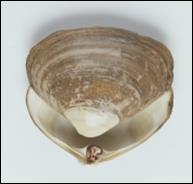
Quahaug (Arctica islandica)
- Maximum length: 13 cm
- Colour: yellowish-brown
- Shape: oval
- Location: Atlantic coast
- Habitat: holes under tidal beach or ocean floor to water depth of 250 m
- Note: among the slowest growing clams harvested commercially
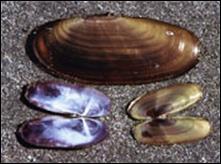
Razor clam (Siliqua patula)
- Maximum length: 25 cm
- Colour: brown or olive green with a small purple area
- Shape: oval
- Location: Atlantic and Pacific coasts
- Habitat: holes under tidal beach or ocean floor to water depth of 20 m
- Note: shell has a sharp edge
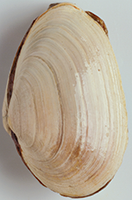
Softshell clam (Mya arenaria)
- Maximum length: 9 cm
- Colour: milky white
- Shape: oval
- Location: Atlantic and Pacific coasts
- Habitat: holes under tidal beaches and ocean floor
- Note: top and bottom shells are different
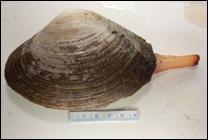
Stimpson's surf clam (Mactromeris polynyma)
- Maximum length: 15 cm
- Colour: yellow or brown
- Shape: an oval or sometimes triangular shell
- Location: Atlantic, Pacific and Arctic coasts
- Habitat: holes under tidal beach or ocean floor to water depth of 100 m
- Note: difficult to distinguish from the Atlantic surf clam
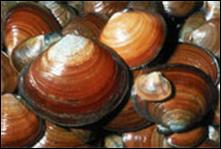
Varnish clam (Nuttallia obscurata)
- Maximum length: can grow to 38 mm in about 4 years, but size and age at maturity aren't known
- Colour: shiny brown
- Shape: round
- Location: Pacific coast
- Habitat: intertidal zone of sand/gravel beaches, and often found in streams, freshwater runoff or groundwater seepage
- Note: also known as a savoury clam
Mussels
The following single species of mussel is harvested.
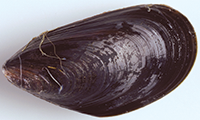
Blue mussel (Mytilus edulis)
- Maximum length: 10 cm
- Colour: bluish-black
- Shape: sides may be straight or curved
- Location: Atlantic and Pacific coasts
- Habitat: inshore waters
- Note: this species is farmed in the Maritimes
Oysters
Species of harvested oysters include the following.
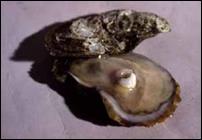
American oyster (Crassostrea virginica)
- Maximum length: 15 cm
- Colour: reddish-brown or purple
- Shape: oval
- Location: Atlantic coast
- Habitat: brackish and salty waters from 2 to 10 m deep
- Note: this species is farmed on leased areas of seabed in the Maritimes
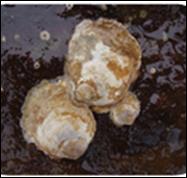
Olympia oyster (Ostrea conchaphila)
- Maximum length: 9 cm
- Colour: white to dark purple
- Shape: oval
- Location: Pacific coast
- Habitat: attached to rocks or hard ground in shallow water
- Note: found in saltwater coves and lagoons and is the only oyster native to the west coast of North America
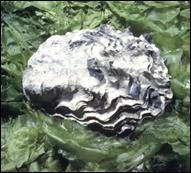
Pacific oyster (Crassostrea gigas)
- Maximum length: 30 cm
- Colour: brown, green or grey
- Shape: fluted shell with a deep cup
- Location: Pacific coast
- Habitat: attached to hard surfaces in shallow water
- Note: rough shell with sculptured appearance
Scallops
Species of harvested scallops include the following.
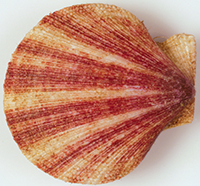
Iceland scallop (Chlamys islandicus)
- Maximum length: 10 cm
- Colour: grey, reddish-brown or chalk white
- Shape: fan-shaped
- Location: Atlantic coast
- Habitat: offshore areas near Newfoundland at water depths of 50 m to 180 m
- Note: reddish-pink upper shell and white or cream-coloured lower shell

Sea scallop (Placopecten magellanicus)
- Maximum length: 20 cm
- Colour: reddish-brown and white
- Shape: fan-shaped
- Location: Atlantic coast
- Habitat: offshore areas including St. Pierre Bank off Newfoundland and Georges Bank off Nova Scotia
- Note: like all scallops, sea scallops have photoreceptive eyes along their edge
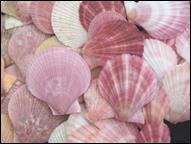
Pink scallops and spiny scallops (Chlamys rubida and C. hastata)
- Maximum length: 8 cm
- Colour: the spiny scallop is reddish-brown and the pink scallop is pinkish-white
- Shape: fan-shaped
- Location: Pacific coast
- Habitat: offshore areas to water depth of 200 m
- Note: while spiny and pink scallops are different species, they’re closely related
- Date modified: